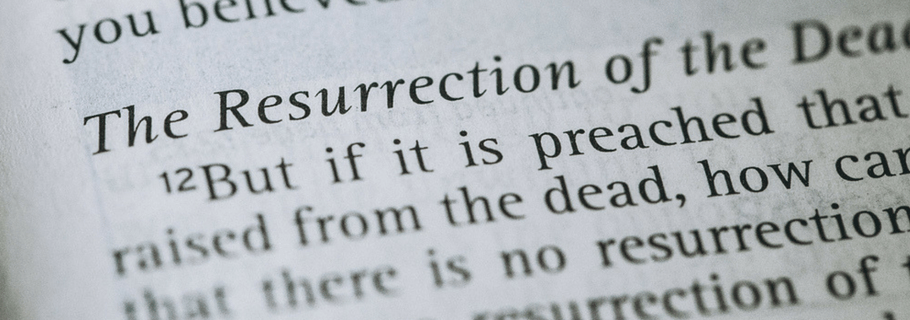This sponsored post is from Know Why You Believe, an online course taught by K. Scott Oliphint, from Zondervan Academic.
If you look at almost any poll about life after death, it will show that the vast majority of people believe in an afterlife. A recent CBS news poll asked more than a thousand adults in America about belief in the afterlife. Three out of four Americans believe in the existence of heaven or hell. When asked where they thought they would spend the afterlife, 82 percent of those polled believed they would spend it in heaven.
In light of this overwhelming consensus, books on people who claim to have experiences of heaven do very well. Heaven Is for Real: A Little Boy’s Astounding Story of His Trip to Heaven and Back by Todd Burpo and Lynn Vincent hit No. 1 on the “USA Today’s Best-Selling Books” list and was later made into a movie.
What makes books like this so popular? Is it the fact that so many already believe in an afterlife? Or could it be that so many who believe in an afterlife are looking for reasons for their belief? My own suspicion is that many who affirm some kind of existence after death are looking for evidence for that belief. Jeffrey Long, a medical doctor, set out to find empirical evidence for life after death, and he claims to have found it. His book Evidence of the Afterlife spent time on the New York Times bestseller list in 2010.
The question of “why” is virtually absent from discussions of our popular belief in the afterlife. We all recognize that there really is no current evidence for life after death. Even Jeffrey Long, in his book, had to admit that the empirical “evidence” that he was able to collect was not evidence of life after death, but of experiences by many people who were “near death.” An experience from people who are near death, even if there are thousands of them that are exactly alike, tells us nothing about what happens after we all die. It only tells us what “near death” patients experience.
Only the Christian position is able to give a full account of what it means to be a person and of what life as a person means. Since most people believe in an afterlife, it might be a good idea to begin with that belief when speaking with people who are skeptical of Christianity.
When we consider the reasons why Christians believe in a future life, we begin at the beginning. When we read about God’s activity of creation in Genesis 1 and 2, we see that the climax of creation was the creation of man and woman in the image of God. For five days, God is simply saying, “Let there be …,” and there was. But on the last day, God takes counsel with himself. In doing so, he is marking the fact that what he is about to create is substantially different from what he has been creating. That difference, as we see in Genesis, is not in the material that God used to create Adam.
Like the animals, Adam was formed “from the dust of the ground.” He was made from the same “stuff” as the animals. The difference for Adam (and, from him, Eve)—and it is a remarkable and profound difference—is that once God formed Adam from the dust of the ground, he “breathed into his nostrils the breath of life.” We also learn that, because it was not good for Adam to be alone, God formed Eve from Adam, so that both of them were, in their creation, made as the image of God.
God created Adam in his image and, unlike the rest of creation, God breathed into Adam the breath of life. Humans bear the image of God and are given the breath of life—what nothing else in creation was given.
We also find out from Scripture that there is a stark division between those who die in Christ and are in fellowship with God, and those who don’t. Jesus spoke of a man who died and was with Abraham, and another man who died but was in torment. In both cases, because each man was made in God’s image, existence continues into eternity. For those who die in Christ, existence continues in him and with God. For those who die in their sins, existence continues, but it consists of nothing but eternal torment.
It is clear from Scripture that “image of God” includes an inbreathed life, an inbreathed character that is distinct from everything else in creation. It is distinct, centrally, in that it implies a relationship with God for eternity that ends either in eternal fellowship with him or in eternal torment under his wrath. The difference has to do with one’s relationship to Christ. But in each and every case, human beings continue to exist beyond death. One either exists eternally with Christ, under God’s grace, or one exists eternally in torment, under God’s wrath. Once we begin to exist, the “life principle” that makes us “image of God” guarantees our eternal existence.
Existence after death is a fact of life. A majority of people believe it. The only real reason to believe it, however, is given to us in the Christian faith. Because God created people as his image, and thus breathed life into them, their existence will never cease.
But existence after death is different from life after death. Life after death is found only in Christ. Without Christ, existence after death, though eternal, is called a “second death.” Without these Christian truths, the best answer one has to the “why” question of life after death is “just because.”
To learn more about the basics of Christian belief, sign up for Know Why You Believe, an online course taught by K. Scott Oliphint. Take a look at the free preview video:










